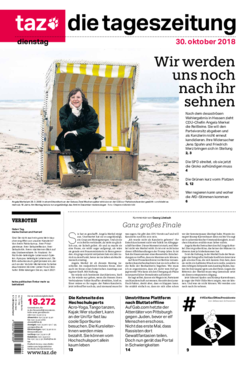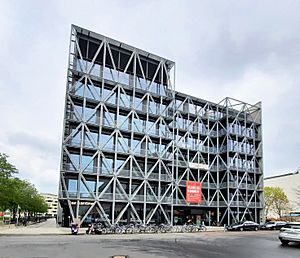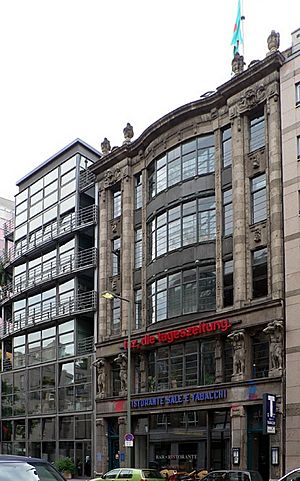Die Tageszeitung facts for kids
 |
|

The 30 October 2018 front page of Die Tageszeitung
|
|
| Type | Daily newspaper |
|---|---|
| Format | Berliner |
| Publisher | taz, die tageszeitung Verlagsgenossenschaft eG |
| Founded | 1978 |
| Political alignment | New left, green left, new social movements, anti-capitalism, feminism, left-wing |
| Language | German |
| Headquarters | Berlin |
| ISSN | 0931-9085 |
Die Tageszeitung (which means "The Daily Newspaper" in German), often called taz, is a German newspaper. It's special because it's run by its employees and a group of shareholders. They work together to keep the newspaper independent, so it doesn't rely too much on advertising.
The newspaper started in 1978 in Berlin. It was part of a movement that wanted to offer different views from traditional newspapers. taz focuses on current events, social issues like fairness, and environmental problems. It often supports green politics and the German Green Party. The newspaper's logo, a paw print, comes from how "taz" sounds like the German word for paw, Tatze. taz is one of Germany's most important newspapers.
In 2024, the management announced that the daily paper edition would stop printing on October 17, 2025. After that, it would only be available online. However, the weekend edition, which features opinion pieces, would still be printed.
Barbara Junge and Ulrike Winkelmann are the main editors of taz.
Contents
History of Die Tageszeitung
Die Tageszeitung began in 1978. From the start, it aimed to be different from other newspapers. It wanted to be "independent, smart, and fun." One way it was different was by paying all employees the same salary until 1991. Today, people in big roles get extra pay, but their salaries are still lower than in other newspaper companies.
Since 1995, taz has included a German version of the monthly newspaper Le Monde diplomatique. This supplement often has translated articles from the French edition.
How taz is Owned
Since 1992, Die Tageszeitung has been owned by its many members. As of August 2022, there were over 22,214 members who helped fund the newspaper. taz was the first German national newspaper to put all its content online in 1995.
At first, Die Tageszeitung had a national edition and a local Berlin edition. Over time, it added local offices for other regions in Germany.
taz has also tried new things. Between 2017 and 2020, it had an online edition in Turkish called taz.gazete. It was also one of the first newspapers to offer articles in simple German, which helps people who find reading difficult. Sometimes, it publishes articles in English as taz in English.
How taz is Organized
The newspaper is supported by a special type of company called a cooperative. Many readers help pay for the newspaper. Employees at taz are paid according to standard agreements for newspapers in Germany.
taz's Political Views
When taz first started, it shared the views of groups that were outside the main political parties in Germany. Its political ideas were often close to The Greens and the SPD. In the 2000s, the newspaper became closer to the more central views of The Greens.
The "Potato Affair"
On June 26, 2006, Die Tageszeitung published a funny, satirical article on its last page. This page is always used for jokes and satire. The article made fun of the Polish president at the time, Lech Kaczyński, and his brother. Because of this article, Lech Kaczyński canceled important talks with Germany and France.
Famous Headlines from taz
taz is known for its clever and sometimes funny headlines. Here are a few examples:
- Oh mein Gott! (Oh my god!) – This was about the election of Joseph Ratzinger as Pope Benedict XVI.
- Es ist ein Mädchen (It's a girl) – This headline celebrated the election of Angela Merkel as the first female Chancellor of Germany.
- Oops – they did it again! – This was used when George W. Bush was re-elected as President of the United States.
In 2008, the paper published a picture with the headline "Onkel Baracks Hütte" (Uncle Barack's Cabin) about Barack Obama. Some readers felt this headline was not appropriate because it referred to an old book with a difficult history.
taz Panter Foundation
The taz Panter Foundation is a non-profit organization based in Berlin. It was created in 2008 to support good causes and give out the taz Panter Prize, which has been awarded since 2005.
The foundation has three main goals:
- It holds workshops for journalists from other countries, especially those where press freedom is at risk.
- It offers training and education programs for young journalists.
- It supports democracy and community involvement, for example, by giving out the yearly taz Panter prize.
See also
 In Spanish: Die Tageszeitung para niños
In Spanish: Die Tageszeitung para niños
- List of newspapers in Germany
 | Isaac Myers |
 | D. Hamilton Jackson |
 | A. Philip Randolph |



